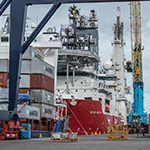
Port Zones UK is a new coalition of British airport and seaport operators, whose aim is to promote regional growth centred on key UK transport hubs, through the designation of enhanced ‘Enterprise, Development and Free Trade Zones’. Founding members of the new organisation include the British Ports Association (BPA), Regional and City Airports (RCA), the Port of Milford Haven, the Port of Tyne and the Institute for Exports.
The UK Government recently announced it was planning to create up to 10 free ports across the UK after Brexit allowing firms to import goods and then re-export them outside normal tax and customs rules. However, Port Zones UK, which was officially launched today, has published a new report – ‘A Licence to Operate: ‘Enterprise, Development and Free Trade Zones’ – which looks in more detail at the potential policy measures needed to make a success of any contemporary free ports programme.
In its report, Port Zones UK states that the UK’s imminent departure from the European Union (EU) has created a fresh impetus for a new and innovative growth-generating policy in regional and coastal communities. However, business conditions need to be created which increase the flow of foreign direct investment, which is central to the future of Great Britain.
The report reveals three key areas of detailed policy which the Government needs to focus on. These include:
- Speeding up the process and granting of planning permissions for development.
- Ensuring that the marine and terrestrial planning systems relating to ports are closely co-ordinated to expedite marine licences.
- Reducing delays arising from environmental legislation such as the Habitats Directive and environmental impact assessments.
Richard Ballantyne, from Port Zones UK, said: “As the UK recasts its global economic relationships, trade has never been so important to the fortune of the nation. Business, consumer and investor confidence are – and will be – inextricably linked to the future success of the British economy.
“However, to forge new trade agreements and transition existing ties, strong domestic foundations are needed to maximise the value of inbound and outbound business flows through our international gateways.”
One of the key areas the report looks at is planning reform and the need to speed up the process for land-side development. For airports and seaports, the power to grant planning permission normally resides with a local planning authority. However, a number of special provisions have been introduced into the planning legislation, or exist, to reduce delays.
The report also examines the different forms that the ‘Enterprise, Development and Free Trade Areas’ could take as demonstrated by members of the new association.
